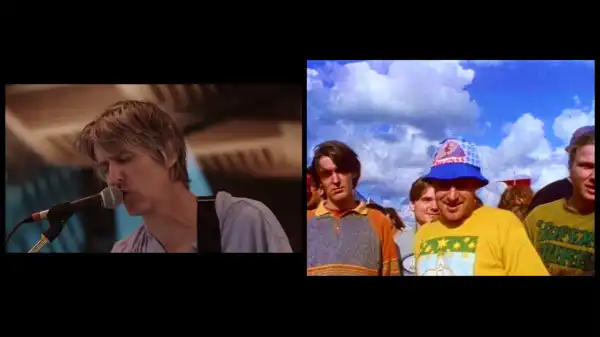
Save this storySave this storySave this storySave this story
Rock documentaries and biopics have been parodied almost since their inception, but there’s a reason for their enduring absurdity that goes beyond mere fan service: music rights. Without the consent of the musicians themselves or their estates, a film that focuses on the music risks becoming like Sofia Coppola’s Priscilla or John Ridley’s Jimmy: All Is by My Side, stripped of the songs that are essential to their narrative. Hence the hagiography. In Pavements, Alex Ross Perry both sidesteps and embraces this problem: his admiration for Pavement permeates the film, and his explicit aim is not to probe hidden depths but to celebrate the band—and to do so in a way that elevates its own self-deprecating brand of anti-celebrity. The result is a kaleidoscopic and vibrant collage, where elements of irony come together to create a deep sincerity intertwined with self-parody (primarily Perry's self-parody) in an artificial artifact that nevertheless proves more authentic than a simple, unedited recording.
The band, which formed in 1989 and broke up in 1999, features heavily, featuring not only archival footage but also new interviews and footage Perry shot during their 2022 reunion tour. There’s much more here, though. Perry created three Pavement-related art projects that will be featured in the film: the jukebox “Slanted! Enchanted!” that my colleague Holden Seidlitz wrote about when it was unveiled in 2022; a museum exhibit dedicated to the band’s memorabilia called “Pavements 1933–2022”; and, finally, the film-within-a-film “Range Life,” a parody biopic dramatizing the band’s activities in 1995.
Pavements, in other words, is the result of years of tongue-in-cheek gimmicks, pranks, and stunts, and the band happily embraces them. The riotous results invite hyperbole; Perry describes the work as a loose mashup of multiple rock-centric films, a “semiotic experiment” that’s also “like throwing spaghetti at a wall,” and I recall an email I sent to a colleague immediately after watching it, in which I called it a “quasi-pseudo-makeover-documentary-biographical.” But the method to Perry’s—and the band’s—madness becomes clear when you consider another film, strictly fictional, in which a single narrative is rendered in several separate, dizzying interpretations: Jared Hess’s 2009 Gentlemen Broncos. There, a teenage science fiction writer named Benjamin (Michael Angarano) goes to a conference for aspiring writers and stumbles upon a story about being kidnapped twice, first by an older writer, then by a pair of teenage filmmakers. Hess dramatizes three different versions of Benjamin's story—his own, the older writer's, and a film by young filmmakers—as the latter film is made.
On Pavements, Perry is both creator and thief, visionary and distorter, a gleeful self-betrayer who demonstrates the essence of irony, achieving truth through lies and authenticity through falsification. With his tongue pressed firmly into his cheek to keep from laughing, he watches the casting and choreography of the stage show, relishing what he describes as an attempt to “put these ironic songs in their most sincere form: the jukebox.” The band’s let’s-put-on-a-show theatrical zeal stands in stark contrast to the band’s fuck-it attitude toward self-presentation; yet, in Perry’s insightful look at the band members, he discovers that irony itself is a mode of performance, underpinned by a sincere principle. In his collection of archival clips – especially those featuring the band's lead singer and songwriter Stephen Malkmus – he reveals a gift as a born performer, which, in short, is the ability to match the moment, whether through musical talent or a memorable joke or gesture, to do remarkable things at the right time.
At just over two hours long, Pavements is split in half, its two halves marking the difference between obligation and creativity, between obligatory figures and freestyle. The first half, which is twice as long, covers the band’s formation and their rise to moderate fame and significant recognition. The main narrative of Pavements is a loose and uneven account of its origins—childhood, college meetings, early collaborations, the various musical configurations that preceded Pavement—and how the band found its way into its career, sound, and ethos. This early section contains insightful observations from the band members about their relationships and their art, as when they improvise about their formative influences. (Malkmus says, “The whole record collection kind of dissolves into who you are. The music you make is part of you, but eighty percent of it is the fantasy of other people that you like,” speaking as the New Wave director.
Sourse: newyorker.com






